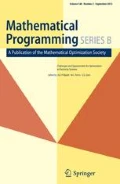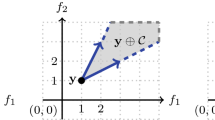Abstract
This paper reports the development of a new algorithm for solving the general constrained optimization problem (that of optimizing an objective function subject to both equality and inequality constraints). The approach is based on the complementary pivoting algorithms which have been developed to solve certain classes of fixed point problems. The specific approach is to use the equality constraints to solve for some variables in terms of the remaining ones thus enabling one to eliminate the equality constraints altogether. The result, under certain circumstances, is an optimization problem which may be transformed into a fixed point problem in such a way that a complementary pivoting code may be used to search for a solution.
Seventeen test problems have been solved by this method and the results are compared against those obtained from GRG (Generalized Reduced Gradient method). The results of the tests indicate that the fixed point approach is robust (all 17 problems were solved by this method where as GRG solved 16). As to the computer times, the fixed point code proved to be as fast or faster than GRG on the lower dimensional problems; however, as the dimension increased, the trend reversed and on a 40 dimensional problem GRG was approximately 11 times faster. The conclusion from these tests is that when the dimension of the original problem can be reduced sufficiently by the equality constraints, the fixed point approach appears to be more effective than GRG.
Similar content being viewed by others
References
J. Abadie and J. Carpentier, “Generalization of the Wolfe reduced gradient method to the case of nonlinear constraints”, in:Optimization (Academic Press, New York, 1969) pp. 37–47.
B.C. Eaves and R. Saigal, “Homotopies for computation of fixed points on unbounded regions”,Mathematical Programming 3(2) (1972) 225–237.
A. Jain, L. Lasdon, M. Ratner and A. Waren, “GRG user's guide”, Technical Memorandum CIS 75-02, Computer and Information Science Department, Cleveland State University (1975).
H.W. Kuhn, “Simplicial approximations of fixed points”,Proceedings of the National Academy of Sciences of the USA 61 (1968) 1238–1242.
O.L. Mangasarian,Nonlinear programming (McGraw-Hill Book Company, New York, 1969).
O.H. Merrill, “Applications and extensions of an algorithm that computes fixed points of certain upper semi-continuous point to set mappings”, Ph.d. Dissertation, Department of Industrial Engineering, University of Michigan (1972).
J.C. Ortega and W.C. Rheinboldt,Iterative solutions of nonlinear equations in several variables (Academic Press, New York, London, 1970).
R.T. Rockafellar,Convex analysis (Princeton University Press, Princeton NJ, 1970).
J. Stoer and C. Witzgall,Convexity and optimization in finite dimensions I (Springer—Verlag, New York, 1970).
M.J. Todd, “Union Jack triangulations”, in: S. Karamardian, ed.,Fixed points: Algorithms and applications (Academic Press, New York, 1977).
Author information
Authors and Affiliations
Rights and permissions
About this article
Cite this article
Solow, D. Comparative computer results of a new complementary pivot algorithm for solving equality and inequality constrained optimization problems. Mathematical Programming 18, 169–185 (1980). https://doi.org/10.1007/BF01588312
Received:
Revised:
Issue Date:
DOI: https://doi.org/10.1007/BF01588312




